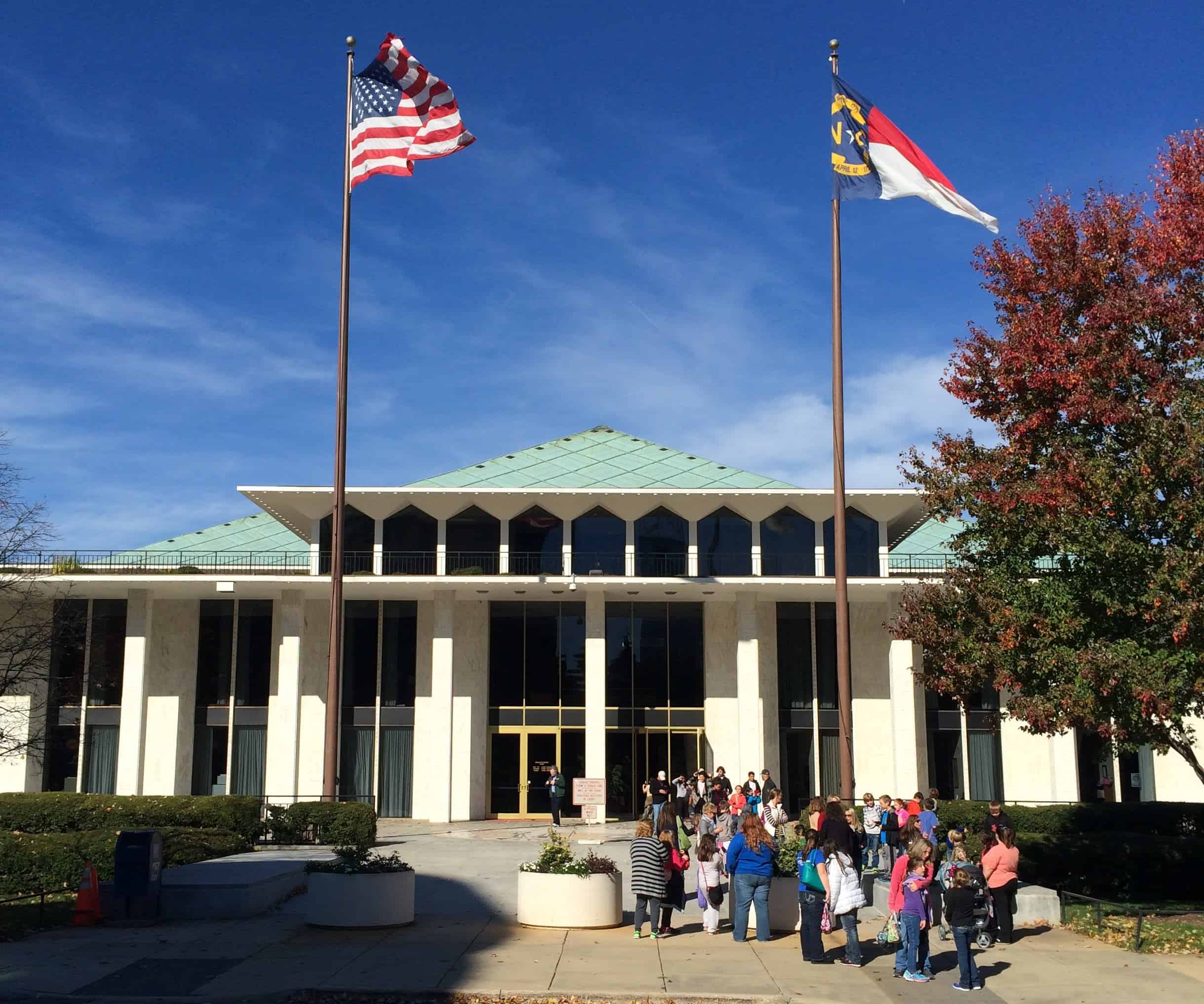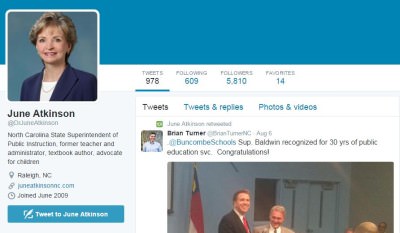A deficit of electable proportions
When North Carolina Republicans took control of the state government in 2012, they quickly set into motion a sweeping agenda to enact conservative social reforms and vastly change how the state spends its money. It was the first time in more than a century that Republicans enjoyed such political dominance in our state.
What brought them all to town? A good reason: in the 2011-12 budget year, North Carolina projected a multi-billion dollar deficit, enough to rank the state among the worst budget offenders in the country and bring a new slate of elected legislators to Raleigh. So Republicans, with a clear mandate to clean up the fiscal mess in November 2012, set to work righting the ship.
On what does a state like ours spend money? Public education, including higher education, consumes about a third of North Carolina’s budget. Health and Human Services, including the state’s Medicaid and unemployment programs, composes an even larger slice, about 37.5 percent.
Other state programs make up little bits and pieces: nearly 8 percent on transportation and highways, 5.5 percent on public safety, 9 percent on natural and economic resources.
In other words, if you want to make big cuts, public education is one of two really big targets.
After that landslide election in 2012, legislators began sharpening their knives.
A fury of budget cuts
Among their first targets: reductions in unemployment benefits, cuts to public schools, including laying off thousands of teachers, and a massive, nearly half-billion dollar slash from the University of North Carolina system.
Two years later, in the last budget cycle, 2014-15, the legislature provided roughly $500 million less for education than schools needed.
Later in the 2013 session, though, the most radical changes in state financing fell into place. Republicans reconstructed the state’s tax code, relieving the burden on corporations and wealthy residents. They continued to take aim at other parts of the education budget, cutting More at Four program dollars and decreasing accessibility for poor families. The state lost thousands more teacher and teacher assistant positions. The bloodletting was fierce. More on that in a minute.
Across the state, local education districts were faced with budget deficits of considerable proportion after legislators hacked away their funding. School systems raided fund balances, rainy day funds set aside for things like natural disasters, not political ones. Elsewhere, employees were furloughed, teachers were laid off, teacher assistants were forced to take other jobs or lose their classroom positions, and so forth. Non-personnel funding disappeared. Textbooks stayed in circulation another year. Buildings were patched together instead of replaced. Education Week called ours “The Most Backward Legislature in America.”
Republicans defended these austerity measures by saying that lower taxes would eventually yield fiscal growth. And they were right. This year, the government is enjoying a $445 million surplus–a clear victory in light of those multi-billion dollar deficits of yore–but still a statistically small number in light of the state’s $21 billion budget (about two percent), especially after considering that our state budget is still smaller than it was in 2011.
In fact, by 2014-15, North Carolina was still spending $100 million less on public education than it had before the economic recession. And over the past ten years, public schools added more than 150,000 additional students. No Republican legislator can honestly say that per pupil expenditures across the state have increased in the last six years.
Taking aim at teachers
Curiously, the Republican-held capital didn’t stop at defunding education. They also took aim at teachers.
N.C. teachers are prohibited by law from unionizing, but they did have a common advocacy group in the North Carolina Association of Educators. In 2011, the legislature passed a law targeting how the group collects dues from member teachers. Then-Governor Beverly Purdue vetoed it. In 2012, the law made its way back to Purdue, who vetoed it again–but the House overrode it during a sneaky, late-night vote. (The law was later found to be discriminatory, retaliatory, and a violation of free speech and thrown out by state courts.)
But with teacher’s main advocacy group effectively muzzled, the legislature was free to run rampant, and teachers quickly came under fire.
Eventually, that compromise became law, and teachers state-wide began the effort of figuring out if their career status or their retirement pension was more important–and once again, the court stepped in and overturned the law. Another legislative overreach corrected by the courts.
(This year, just for kicks, the N.C. Senate is proposing an end to teacher healthcare coverage in retirement. “That’s something that should have been done a long time ago,” state Rep. Gary Pendleton said.)
The assault didn’t stop with the assaults on new and tenured teachers. It continued on teacher preparation programs, including the North Carolina Teaching Fellows Program.
The Teaching Fellows program was arguably one of the best teacher prep scholarships in the nation; it celebrated a better retention rate than its federally funded cousin, Teach For America, and it produced droves of quality teachers who filled hard-up school classrooms. Its budget was a modest one, and yet Republicans uprooted it from the state budget and killed the entire program.
This year, with its final class of scholars graduating college, the program officially flat-lined. State Teacher of the Year Keana Triplett called the legislature’s shuttering of the Teaching Fellows “the single biggest mistake in public education.”
The result? Enrollment in teacher prep programs in the UNC system hasdropped 27 percent in the last five years. A teacher shortage is just around the corner.
First, weaken schools. Then print parents a ticket out–and into for-profit schools.
North Carolina schools were dealt another blow when the legislature re-ordered how schools are evaluated in 2012. The new evaluations, which used an A-F grading system, were intended to provide an easier to understand metric for school effectiveness.
The result? More than 700 of the state’s public schools (nearly thirty percent) received a score of D or F. Many parents struggled to understand how so many schools could so quickly fail.
But instead of demonstrating the quality of a school, the state’s new grading measure much more accurately described the socio-economic status of its enrolled students–nearly every one of the state’s “failing” schools were considered high-poverty schools. The state of Virginia, which also had an A-F rating system, got rid of the system because it was ineffective.
Teacher salaries fell to near the bottom among all states in the nation and worst in the South after five years with zero pay increases. And when Republicans finally acted to increase teacher pay, they claimed to make the biggest pay hike in state history–but in reality only bumped up paychecks by an average of $270 per year. When you factored inflation into the mix,teachers were losing money.
Meanwhile, Texas and Virginia started actively recruiting North Carolina teachers to go work in their states. It didn’t take much to convince Tarheel teachers to flee–especially after some teachers discovered they earned substantially less money than when they started thanks to inflation.
In case pitiful paychecks weren’t enough to deter teachers from returning to work, the legislature next took aim at teacher tenure. The Republican-led proposal initially was to eliminate tenure altogether, but eventually they came up with a plan that would grant teachers pay raises for giving up their career status. It was, as I wrote then, a clever way of getting rid of veteran teachers.
No matter, though. It was perfect timing for the legislature’s next move: with this new “evidence” that North Carolina schools were failing in their mission, the state could move forward with its plan to grant parents options–freedom of choice was how the Republicans phrased it–and built a tuition voucher plan that sent tax dollars to parents who opted out of public schools and into private or religious schools. Despite another lawsuit, this time the legislature came out on top after a court upheld the practice.
In principle, voucher programs seem to make sense: give parents the opportunity to send their kids to another school besides the failing one in their neighborhood. Republicans like to say this is how business works–if the store in your town isn’t very good, you shop somewhere else.
When it comes to schools, though, the capital doesn’t add up. Vouchers take dollars away from those failing public schools, which all but guarantees they will continue to struggle as desperately needed resources are diverted elsewhere. It’s like making McDonald’s pay for your Whopper at Burger King because the McDonald’s got a bad health rating. It’s a bad idea.
To make matters worse, the legislature took away cap restrictions on charter schools, which have grown by nearly 50 percent in number and doubled their student enrollment since 2010.
But the legislature has also weakened oversight at public charters–introducing legislation this year to remove them from the Department of Public Instruction’s management altogether. The result is a diminished accountability for tax payer dollars spent in schools–the exact opposite of what the legislature said was important when it came to public schools originally.
(And aren’t you curious why the legislature has been so kind to charters? It isn’t hard to figure out when you follow the money. Apparently if you have a lobbyist group that isn’t a teacher’s “union,” nothing is impossible in Raleigh.)
The legislature then opened up the charter field to for-profit companies, many of which have terrible track records for effectiveness, and some of whom have benefited from zero-bid competition for state tax dollars.
That’s right–our state government has maimed public schools so it can offer tax dollars to for-profit charters and private schools with totally inadequate government oversight from the same systems that declared public schools inadequate in the first place.
No mercy for the UNC system, either.
I’ve spent a long time documenting the war on K-12 education, but the state’s university system–arguably one of the best in the country–hasn’t been spared the wrath of Raleigh. In addition to the hundreds of millions in lost funding, the legislature has targeted the University of North Carolina jsystem in the last couple of years, pushing it to shift priorities and philosophies.
The most notable–and blatant–target was UNC System President Tom Ross, who was forced to resign after a record of commendable service to the university. Ross, who was appointed in 2010, when Democrats controlled the legislature, had done nothing wrong–and yet he was pushed out in favor of a replacement more agreeable to the radical changes in store for UNC.
What might those be? Among other things, this year, the House saw proposed legislation designed to fundamentally alter how professors work in the university.
And Elizabeth City State University, one of two historically black institutions in the UNC system, has long been picked upon by legislators bent on shutting it down. In 2014, the Senate approved a study to determine the feasibility of eliminating ECSU, but so far it’s been spared.
School starts soon, but no budget till Labor Day?
Let’s review. With an unassailable, veto-proof majority, North Carolina Republicans seized control of this state and unleashed a devastating blow to public schools.
They have systematically pared budgets to the bone. They have insulted, antagonized, and demoralized teachers through stingy salary offerings–and they’ve muted the organization that had for many years protected them.
As a result, public schools have suffered, and Republicans went the extra mile to design a new school rating system that exploited every weakness. It became the perfect excuse to bring private schools and for-profit operators into the mix, diverting critical taxpayer dollars from public schools into the deep pockets of companies like Pearson, sometimes without even a competitive bid process.
And now? What’s happening today?
Well, we’re five weeks overdue on the budget, and some legislators are saying the budget might not be settled until Labor Day. Meanwhile, school systems are grasping at straws trying to figure out whether or not they can hire teachers or teacher assistants (whose jobs might have to be cut). At stake in the forthcoming budget negotiations: teacher pay, whether or not to lay off 8,500 teacher assistants, and proving no budget line is too small to be spared, driver’s education.
Further, with no clear direction on what the state might decide in regard to classroom size, principals don’t even know how many classrooms they’ll need–and school starts in just a few short weeks.
Make no mistake: this is a war against public education.
Teachers are losing. I have been reading and writing about education in North Carolina for several years now, and while it might not always appear obvious, our state has formed a cohesive and coordinated attack against public schools.
Public education is at risk. And with every measure–every budget cut, every insult, every weakening–our school house slides toward devastation.





